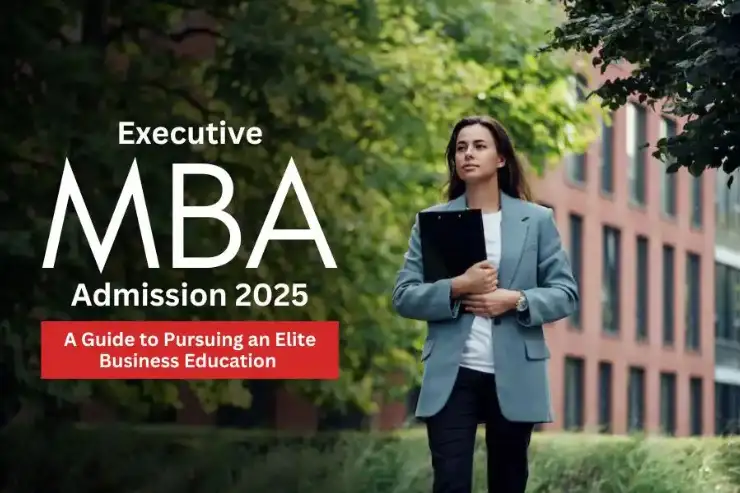The Executive MBA (EMBA) program is an excellent choice for professionals seeking to enhance their managerial skills, expand their network, and advance their careers. As we approach 2026, it’s important to understand the admission process for Executive MBA programs and prepare accordingly. In this comprehensive blog post, we will cover all the essential topics related to Executive MBA admission for the year 2026.
The Importance of Executive MBA Programs:
Executive MBA programs are designed for experienced professionals who want to acquire advanced business knowledge and skills while continuing to work.
The prestige and reputation of Executive MBA programs make them highly sought-after by both individuals and organizations.
A key benefit of an Executive MBA admission is the opportunity to learn from renowned faculty and industry experts, who provide cutting-edge insights and real-world case studies.
Researching Executive MBA Programs:
Begin your journey by researching different Executive MBA programs available in 2026.
Consider factors such as program duration, curriculum structure, accreditation, and location, to ensure a good fit for your personal and professional goals.
Take into account the program’s reputation, alumni network, and career services offered to help boost your post-EMBA opportunities.
Admission Requirements:
Executive MBA programs typically have specific admission requirements that vary from traditional MBA programs.
Applicants are required to have significant work experience (ranging from 6 to 15 years) to bring diverse perspectives to the classroom.
A bachelor’s degree from an accredited institution is usually a prerequisite, along with professional achievements and leadership experience.
Which Esteemed Colleges in India Offer an Executive MBA?
Here are some well-known Indian institutions that have offered EMBA programs:
Indian Institutes of Management (IIMs): Several IIMs across India offer Executive MBA programs. Some of them include IIM Ahmedabad, IIM Bangalore, IIM Calcutta, IIM Lucknow, and others.
Indian School of Business (ISB), Hyderabad, and Mohali: ISB offers a Post Graduate Program in Management (PGP) for executives.
XLRI – Xavier School of Management, Jamshedpur: XLRI offers an Executive MBA program called the “Executive Post Graduate Program in Management (EX-PGP).”
SP Jain Institute of Management and Research, Mumbai: They offer an Executive MBA program.
Management Development Institute (MDI), Gurgaon: MDI offers an Executive MBA program for working professionals.
Indian Institute of Foreign Trade (IIFT): IIFT offers an Executive Post Graduate Diploma in International Business (EPGDIB) for executives.
Narsee Monjee Institute of Management Studies (NMIMS), Mumbai: NMIMS offers an Executive MBA program.
Symbiosis Institute of Business Management (SIBM), Pune: SIBM offers an Executive MBA program known as the “Post Graduate Diploma in Management for Executive Education (PGDM-EE).”
Great Lakes Institute of Management, Chennai: They offer an Executive MBA program.
Tata Institute of Social Sciences (TISS), Mumbai: TISS offers an Executive Post Graduate Diploma in Human Resource Management (HRM).
IMT Ghaziabad: IMT offers an Executive MBA program for working professionals.
FORE School of Management, New Delhi: They offer an Executive PGDM program.
Preparing for the GMAT or Executive Assessment (EA):
Most Executive MBA programs require applicants to submit GMAT or Executive Assessment (EA) scores, which test analytical, verbal, and quantitative reasoning skills.
Start early to take these exams, allowing time for preparation and potential retakes to achieve a competitive score.
Utilize study resources and consider taking preparatory courses to familiarize yourself with the exam structure and content.
Crafting a Strong Application:
The application process for Executive MBA admission 2026 is highly selective, so it’s crucial to present yourself effectively.
Highlight your professional achievements, leadership experience, and career goals in your resume and application essays.
Provide strong recommendation letters from supervisors or colleagues who can speak to your abilities and potential.
The Importance of a Well-Crafted Statement of Purpose:
The statement of purpose is a critical component of your Executive MBA application.
Use this opportunity to convey your aspirations, motivations, and why you believe an Executive MBA admission is the right pathway for your professional growth.
Be specific about why you are interested in a particular program and how it aligns with your career goals.
Preparing for Interviews:
If shortlisted, you will likely be invited for an interview as part of the Executive MBA admission process.
Research the program thoroughly and anticipate common interview questions.
caDemonstrate your knowledge of the program and emphasize how your skills and experience align with the program’s objectives.
Pursuing an Executive MBA admission 2026
can be a transformative step towards future career advancement. By understanding the admission process and preparing effectively, you can increase your chances of being accepted into a reputable program that matches your aspirations. Remember to leverage your unique experiences and leadership qualities throughout the application process, and embrace the learning opportunities an Executive MBA can provide.
Frequently Asked Questions
Most Executive MBA programs require candidates to have significant work experience of at least 6-8 years, and some may require even more, starting from 10-15 years
Professional achievements and leadership experience are also taken into account as part of the admission process.
A bachelor’s degree from an accredited institution is typically a prerequisite for Executive MBA admission. However, some programs may consider candidates without a degree if they have sufficient work experience and demonstrate exceptional leadership potential.
Recommendation letters are an essential part of the application process for Executive MBA admission as they provide insights into the candidate’s teamwork, leadership skills, and character. Applicants typically submit two to three letters of recommendation from professional contacts such as supervisors, colleagues, or clients.




